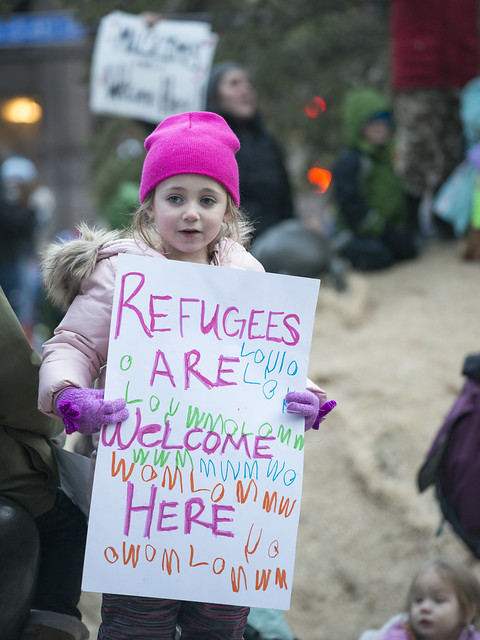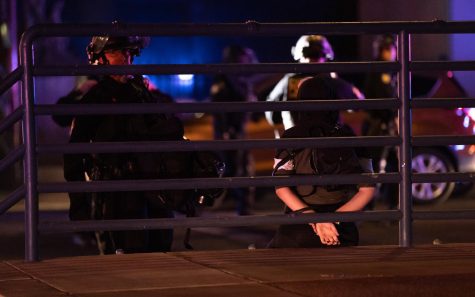Detained immigrant children in a Clint, Texas facility living in unsanitary and unsafe conditions have generated outrage—despite reports that some children have been moved, exact locations are unreported.
June 29, 2019
The Justice Department of the Trump administration argued June 18 in federal court for reversal of a settlement agreement from 1997, that ruled in favor of cooperating with migrants and ensuring proper conditions.
The judges in the Ninth Circuit expressed confusion as to why toiletries such as toothpaste, soaps and towels were not a part of ‘safe and sanitary’ language expressed in the settlement.
Sarah Fabian Justice Department attorney repeatedly argued to focus on the language stating that a vague settlement agreement risked the government of being found in violation of the settlement without intending to breach the agreement.
“What I’m disagreeing with is that the court ultimately concluded these things would fall under here [agreement]–and then simply by not providing them you have violated that tentative agreement,” Fabian said.
“It’s within everybody’s common understanding that you know- if you don’t have a toothbrush, if you don’t have soap, if you don’t have a blanket, it’s not safe and sanitary” Senior U.S Circuit Judge A. Wallace Tashima said, “You mean there are circumstances when a person doesn’t need to have a toothbrush, toothpaste and soap? For days?”
Fabian insisted that settlement agreement may have been intended for a much shorter stay at these facilities and the judges argued that was there an argument for ‘safe and sanitary’.
The Department of Health and Human Services made a statement last week that unaccompanied minors “are waiting too long in CBP facilities that are not designed to care for children.”
According to the law, migrant children are not to be held in customs and border patrol facilities for more than 72 hours. They should be relocated with the Department of Health and Human Services where there are shelters, housed with relatives or guardians. When they cannot find a guardian they are sometimes sent to foster homes. But this is not happening in Clint.
Another facility in Brownsville, Texas has been holding children for 52 days on average.
In 2017 the government was taken to court to settle an agreement that surrounded 4 migrant children that filed a class action lawsuit that stemmed from a 1987 case against the government “over poor detention condition for minors in U.S. custody.” according to Plaintiff’s, Defendants were in breach of the agreement for six reasons.
Continuing to detain class members in deplorable and unsanitary conditions in Customs and Border Protection facilities, failing to advise class members of their rights under the Agreement, failing to make and record ongoing efforts aimed at release or placement of class members, detaining class members for weeks or months in secure, unlicensed facilities, commingling class members with unrelated adults for extended periods and interfering with class members’ right to counsel.
Attorneys have visited the facilities under the Flores settlement agreement, outlining standards for the detention and release of unaccompanied minors taken into custody of the Immigration and Naturalization Service (INS).
Elora Mukherjee, director of the Immigrants’ Rights Clinic at Columbia Law School in New York City and one of the many attorneys who visited facilities to interview detainees stated the children she spoke to had not been allowed to shower since crossing the border, their clothes were stained with mucus and urine and they slept on concrete floors with no blankets.
This is a widespread problem with many of these facilities where children are without the means of a shower, food and basic toiletries to prevent widespread infection and disease. They are in danger of disease, infections and trauma.
“They are already fleeing from the worst trauma we can imagine. To be detained in conditions like this compounds the trauma.” Mukherjee said.
There have been five immigrant children who have died since last year in the care of this administration, however, Kevin McAllen, the acting Homeland Security Secretary under the Trump administration addressed the conditions during a House hearing but walked out of a press conference on Friday after four questions.
Brian Hastings, the Border Patrol’s chief of law enforcement operations contradicted reports about its ‘inhumane’ conditions as stated by Mukherjee during a Senate Homeland Security and Governmental Affairs Committee hearing Wednesday.
“We provide three meals — hot meals– a day and snacks are unlimited to those who want them,” Hastings said.
Hastings suggested the reports couldn’t be trusted.
From the beginning of this year until now there has been a surplus of immigrants entering the United States more than in previous years. A total of 109,144 migrants have been detained by Border Patrol just last month.
Trump, in his usual fashion, accused Democrats for all detainee problems.
“If they changed the asylum, if they’d change loop-holes, everything on the border would be perfect.” Trump said in a televised interview in MSNBC
The Customs and Border Protection has issued the order to send some new migrant arrivals to other facilities but according to Mukherjee, after her recent visit to the Clint, Texas facility told NPR that no one really knows where the children have been moved.
“We don’t know where those children are being moved. We don’t know if those facilities have the same appalling conditions that we’ve seen in Clint. We saw children hungry, dirty, sick and scared.
The Clint facility is one of the two facilities by attorneys that have filed a restraining order on after the reports that conditions inside are “so unsafe and unsanitary” that they have declared it a ‘public health emergency’ according to an ABC News report.
After widespread reports of mistreatment likened to ‘torture” became public the U.S. Customs and Protection agreed to open the doors to some news media.
Reports indicate that the Clint facility was beginning the process of “cleaning up” after many Americans became outraged and reports surfaced globally as well, but some news organizations saw signs of “prison like” conditions and detainment of children well after the 72 hour mandate. Many children had been detained in the Clint facility for over ten days or longer.
The CBP did not allow news organizations to film inside or speak with children citing legal privacy issues.
$4.5 billion was approved by House lawmakers Tuesday night that would provide humanitarian assistance across the southern border.












